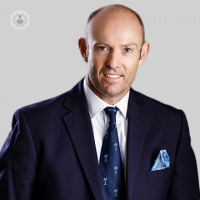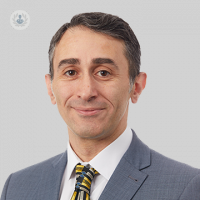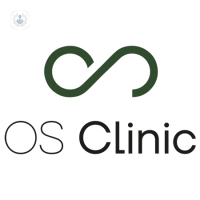What is a rotator cuff injury?
Rotator cuff injuries include inflammation, or partial or complete damage of the tendons of the shoulder. The rotator cuff is a group of four tendons that converge and surround the front, back, and top of the head of the humerus. These tendons are individually connected to very important muscles that cover the shoulder blade (scapula). When these muscles contract, they stimulate the rotator cuff tendons, causing the movements of elevation, separation, and internal and external rotation, hence the name "rotator cuff”.
The main injuries to the rotator cuff are tendonitis and tears:
- Tendonitis of the rotator cuff : occurs when the tendons of the joint become inflamed.
- Tears of the rotator cuff : when one of the tendons detaches from the bone. The tear may be partial or complete, and may occur suddenly or slowly over time.
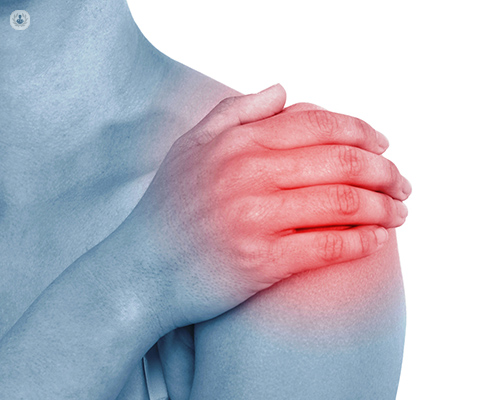
Prognosis:
Rotator cuff injuries are painful and can impede mobility, which has an impact on the patient's quality of life.
If the injured rotator cuff is not treated properly, it can cause chronic stiffness and weakness, and can progressively wear away the shoulder joint.
Symptoms of rotator cuff injuries:
The main symptoms of rotator cuff injuries are:
- Pain and tenderness in the shoulder, which may extend to the arm.
- Severe pain when lifting the arm sideways, lifting weight, or trying to reach behind oneself.
- Pain when sleeping on the affected shoulder.
- Mobility problems in the shoulder.
Medical tests for rotator cuff injuries:
The orthopaedic surgeon will begin with a physical examination in which he or she will press on different points of the shoulder and move the patient's arm, as well as examining the strength of the arms.
If the physical examination is not conclusive, imaging tests such as an ultrasound, X-ray or MRI may be used.
Can rotator cuff injuries be prevented?
Rotator cuff injuries can be prevented by avoiding activities that cause them, such as certain sports that involve arm movements (e.g. tennis or cricket). Also, certain jobs that require use of the arms for several hours, such as carpentry or painting. Exercising and strengthening the shoulders and arms is also a good way to prevent injuries.
Treatments for rotator cuff injuries:
In some cases, conservative treatment with rest, physical therapy exercises, and the application of ice is enough to treat a rotator cuff injury. In cases where conservative treatment is not enough, pain injections, physical therapy sessions, or surgery to repair the tendon or even a tendon transplant may be prescribed. This intervention can be done either by open surgery or laparoscopy.
Which specialist treats rotator cuff injuries?
An orthopaedic surgeon is the ideal specialist to diagnose and treat rotator cuff injuries. A physiotherapist will also be involved in the treatment and rehabilitation of the injury.
11-13-2012 11-14-2023Rotator cuff injury
Mr Andreas Baumann - Orthopaedic surgery
Created on: 11-13-2012
Updated on: 11-14-2023
Edited by: Conor Dunworth
What is a rotator cuff injury?
Rotator cuff injuries include inflammation, or partial or complete damage of the tendons of the shoulder. The rotator cuff is a group of four tendons that converge and surround the front, back, and top of the head of the humerus. These tendons are individually connected to very important muscles that cover the shoulder blade (scapula). When these muscles contract, they stimulate the rotator cuff tendons, causing the movements of elevation, separation, and internal and external rotation, hence the name "rotator cuff”.
The main injuries to the rotator cuff are tendonitis and tears:
- Tendonitis of the rotator cuff : occurs when the tendons of the joint become inflamed.
- Tears of the rotator cuff : when one of the tendons detaches from the bone. The tear may be partial or complete, and may occur suddenly or slowly over time.

Prognosis:
Rotator cuff injuries are painful and can impede mobility, which has an impact on the patient's quality of life.
If the injured rotator cuff is not treated properly, it can cause chronic stiffness and weakness, and can progressively wear away the shoulder joint.
Symptoms of rotator cuff injuries:
The main symptoms of rotator cuff injuries are:
- Pain and tenderness in the shoulder, which may extend to the arm.
- Severe pain when lifting the arm sideways, lifting weight, or trying to reach behind oneself.
- Pain when sleeping on the affected shoulder.
- Mobility problems in the shoulder.
Medical tests for rotator cuff injuries:
The orthopaedic surgeon will begin with a physical examination in which he or she will press on different points of the shoulder and move the patient's arm, as well as examining the strength of the arms.
If the physical examination is not conclusive, imaging tests such as an ultrasound, X-ray or MRI may be used.
Can rotator cuff injuries be prevented?
Rotator cuff injuries can be prevented by avoiding activities that cause them, such as certain sports that involve arm movements (e.g. tennis or cricket). Also, certain jobs that require use of the arms for several hours, such as carpentry or painting. Exercising and strengthening the shoulders and arms is also a good way to prevent injuries.
Treatments for rotator cuff injuries:
In some cases, conservative treatment with rest, physical therapy exercises, and the application of ice is enough to treat a rotator cuff injury. In cases where conservative treatment is not enough, pain injections, physical therapy sessions, or surgery to repair the tendon or even a tendon transplant may be prescribed. This intervention can be done either by open surgery or laparoscopy.
Which specialist treats rotator cuff injuries?
An orthopaedic surgeon is the ideal specialist to diagnose and treat rotator cuff injuries. A physiotherapist will also be involved in the treatment and rehabilitation of the injury.


Rock climbing injuries: Accurate diagnosis and effective treatment at an arm’s reach
By Mr Simon Moyes
2024-12-14
In this detailed guide on preventing, diagnosing, and treating rock climbing injuries, renowned consultant orthopaedic and sports medicine surgeon Mr Simon Moyes provides expert insights. The leading specialist covers common rock climbing injuries and the movements that can strain climbers' bodies. See more
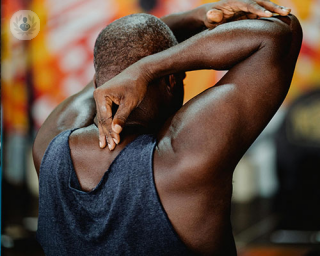

Rotator cuff injuries: when surgery is the right solution
By Mr Daniel Neen
2024-12-14
The rotator cuff is a collection of muscles and tendons in the shoulder that anchors the upper arm bone, called the humerus, to niches in the scapula, helping the shoulder joint move in a ball-and-socket configuration. The rotator cuff helps the shoulder and arm move fluidly and without pain, but they can get injured from overuse, accidents, or wear away with time. People whose work requires them to perform a lot of overhead motions, such as carpenters and gymnasts, are prone to rotator cuff damage. In this article, a leading orthopaedic surgeon discusses the many ways to treat an injured rotator cuff, and how to know if surgery is necessary. See more


Why does my shoulder hurt? The many causes of shoulder pain
By Mr Ioannis Polyzois
2024-12-13
The shoulder is the most flexible joint in the human body with the widest range of motion. It is involved in a great number of everyday activities, including reaching up to cupboards, reaching behind our backs and brushing our hair. Expert orthopaedic surgeon Mr Ioannis Polyzois explains. See more
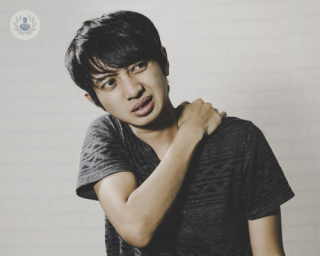

When is surgery required for a rotator cuff injury?
By Mr Ankit Desai
2024-12-13
Rotator cuff injuries are common shoulder problems that can range from mild inflammation to severe tears requiring surgical intervention. Leading consultant orthopaedic surgeon specialising in shoulder, elbow, and upper limb conditions Mr Ankit Desai aims to provide insight into when surgery becomes necessary for a rotator cuff injury. See more
Experts in Rotator cuff injury
-
Mr Simon Lambert
Orthopaedic surgeryExpert in:
- Shoulder instability
- Arthritis
- Rotator cuff surgery
- Rotator cuff injury
- Shoulder surgery
- Shoulder replacement
-
Mr Ali Al-Sabti
Orthopaedic surgeryExpert in:
- Shoulder arthroscopy
- Rotator cuff surgery
- Rotator cuff injury
- Arthroscopic subacromial decompression
- Shoulder replacement
- Shoulder surgery
-
Mr Graham Tytherleigh-Strong
Orthopaedic surgeryExpert in:
- Shoulder surgery
- Shoulder instability
- Rotator cuff injury
- Sports injuries
- Elbow
- Sternoclavicular joint
-
Mr Omar Haddo
Orthopaedic surgeryExpert in:
- Shoulder surgery
- Rotator cuff injury
- Elbow Pain
- Wrist surgery
- Hand injury
- Frozen shoulder
-
Mr Ravi Badge
Orthopaedic surgeryExpert in:
- Carpal tunnel syndrome
- Cubital tunnel syndrome
- Trigger finger
- Thumb Osteoarthritis
- Epicondylitis (tennis elbow)
- Rotator cuff injury
- See all

OS Clinic
OS Clinic
OS Clinic, 45 Queen Anne St, London W1G 9JF
No existe teléfono en el centro.
By using the telephone number provided by TOP DOCTORS, you automatically agree to let us use your phone number for statistical and commercial purposes. For further information, read our Privacy Policy
Top Doctors

The Wellington Hospital - part of HCA Healthcare
The Wellington Hospital - part of HCA Healthcare
Wellington Hospital South Bldg, 8A Wellington Pl, NW8 9LE
No existe teléfono en el centro.
By using the telephone number provided by TOP DOCTORS, you automatically agree to let us use your phone number for statistical and commercial purposes. For further information, read our Privacy Policy
Top Doctors

The Princess Grace Hospital - part of HCA Healthcare
The Princess Grace Hospital - part of HCA Healthcare
The Princess Grace Hospital, 42-52 Nottingham Pl, W1U 5NY
No existe teléfono en el centro.
By using the telephone number provided by TOP DOCTORS, you automatically agree to let us use your phone number for statistical and commercial purposes. For further information, read our Privacy Policy
Top Doctors
-
OS Clinic
OS Clinic, 45 Queen Anne St, London W1G 9JF, W1G Marylebone LondonExpert in:
- Hip
- Minimal access surgery (keyhole surgery)
- Joint preservation surgery
- Maxillofacial Surgery
- Orthopaedic surgery
- Orthopaedic spinal surgery
-
The Wellington Hospital - part of HCA Healthcare
Wellington Hospital South Bldg, 8A Wellington Pl, NW8 9LE, Central LondonExpert in:
- Digestive
- Cardiology
- Orthopaedic surgery
- Orthopaedic spinal surgery
- Intensive care
- Spine
-
The Princess Grace Hospital - part of HCA Healthcare
The Princess Grace Hospital, 42-52 Nottingham Pl, W1U 5NY, Central LondonExpert in:
- Cancer
- General Surgery
- Orthopaedic surgery
- Robotic Surgery
- Intensive care
- Sports Medicine
- Most viewed diseases, medical tests, and treatments
- Ulnar nerve entrapment
- Peripheral nerve block
- Peripheral neuropathy
- Joint pain
- Lumbar herniated disc
- Spinal surgery
- Minimal access surgery (keyhole surgery)
- Shoulder pain
- Osteoporosis
- Botulinum toxin (Botox™)



